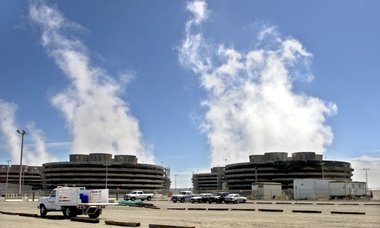forum
library
tutorial
contact

Columbia Generating Station: Why Relicense
a Nuclear Power Plant 10 Years Early?
by John Pearson
The Oregonian, July 30, 2012
|
the film forum library tutorial contact |

|
Columbia Generating Station: Why Relicense
by John Pearson
|
 In May, 10 years earlier than required, the Nuclear Regulatory Commission extended the license of the Columbia Generating Station, the Northwest's only commercial nuclear power plant, to 2043.
In May, 10 years earlier than required, the Nuclear Regulatory Commission extended the license of the Columbia Generating Station, the Northwest's only commercial nuclear power plant, to 2043.
Located along the Columbia River within Washington's Hanford Nuclear Reservation, the Columbia Generating Station is now 30 years old. It was formerly known as Washington Public Power Supply System Nuclear Plant No. 2 -- the only nuclear plant completed by Washington public power utilities out of five under construction, leading to what was at the time the largest municipal bond default in U.S. history. WPPSS (pronounced "whoops") has since changed its name to Energy Northwest.
Though this premature relicensing decision was disappointing, it was predictable. Only one license to operate a nuclear power plant, out of nearly 200 applications, including relicensing, has ever been rejected by the NRC. More than 70 U.S. nuclear plants that were designed to operate for 40 years are now being run for 60 years in what amounts to a global experiment in extended repair and maintenance.
The CGS nuclear plant is a GE Mark II boiling water reactor similar to the four Fukushima Dai-ichi plants that experienced catastrophic accidents in Japan last year. It has an elevated spent fuel pool, inadequately reinforced, that is identical to one that has cracked at Dai-ichi No. 4, which still threatens Japan and the North Pacific with another release of radioactive material. The CGS nuclear plant also shares the potential problem of improper venting that caused hydrogen explosions at three of the Fukushima reactors when they lost their coolant.
Neither of these issues -- nor the additional documented earthquake faulting in the Yakima Fold and Thrust belt, putting the nuclear site at greater risk of seismic activity -- was considered in the relicensing process.
Energy Northwest's CEO Mark Reddemann asserted in a June 25 commentary in The Oregonian ("There's no rubber-stamping a nuclear plant's license") that electricity from the CGS nuclear plant is essential to meet regional energy needs, but according to figures from the state of Washington, this plant has produced only about 5 percent of the electricity that Washingtonians consumed from 2000 to 2010. Last year, because of a six-month shutdown for repairs, the plant produced even less.
In fact, operating the nuclear plant often conflicts with hydro and wind power as the region struggles with oversupply. As Reddemann acknowledged at the Energy Northwest executive board meeting in Portland on June 27: "This time of year is a real challenge for BPA [Bonneville Power Administration]. They've got a huge amount of supply, and demand has never recovered since 2007. They are really in a tight spot."
Many of us who have looked closely at nuclear power issues believe that relicensing this aging nuclear plant simply makes no sense. If the true costs are included, the energy produced is extremely expensive, and the toxic wastes produced pose an unacceptable health risk.
Given the value of the lives and property of more than 250,000 people living in the Tri-Cities and the surrounding communities -- along with the value of the Columbia River for its salmon fishery, agriculture, drinking water and recreation -- we believe that the region deserves a more thorough process. What we received was a rush job, 10 years before it was due, that did not consider all the evidence.
learn more on topics covered in the film
see the video
read the script
learn the songs
discussion forum
